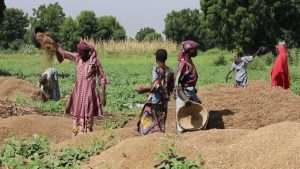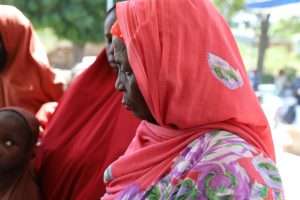The Impacts of MNJTF’s Non-Kinetic Efforts in the Lake Chad Basin
The Impacts of MNJTF’s Non-Kinetic Efforts in the Lake Chad Basin
By Lawrence Bilal Audu
MAIDUGURI: The harvest this year in the Lake Chad Basin has brought a renewed sense of hope and prosperity to the communities residing in the region. While it may not have reached the levels seen before the devastating Boko Haram insurgency, there is a remarkable difference when compared to the last six years of turmoil and despair.
Thanks to Although the Multinational Joint Task Force (MNJTF) and their relentless efforts in conducting clearance operations, many communities have been able to return to their homes and resume their economic activities. However, despite the significant progress made, there still lingers a sense of fear among the residents due to the possibility of isolated attacks by dormant terrorist cells.
Among the communities benefiting from the MNJTF’s non-kinetic interventions is Monguno. The Civil-Military Cooperation (CIMIC) activities carried out by the MNJTF, in collaboration with their partners, particularly COGINTA, Non-Governmental Organization aimed at supporting the communities in recovering from the devastating Boko Haram attacks they have endured, have brought tangible benefits in the form of Quick impact Projects to the resettled residents. Many individuals have been empowered with life-changing tools and resources to support their livelihoods. Communities in the region have also received hospitals, irrigation equipment and boreholes in addition to renovation of schools and the provision of educational materials.

These non-kinetic efforts are hinged on the focus of the Force Commander, Major General Ibrahim Sallau Ali under the dynamic leadership of the Chief of Defence Staff, General Chris Musa whose vision of peace, security and rapid economic recovery transcends beyond the Lake Chad Basin, but not also limited to just the entire West African sub-region.
General Ali, has on several occasion, expressed the need for community cooperation and support to effectively carry out operations. He also encouraged the community members to make the most of these projects by utilizing and maintaining them properly.
Aisha Bukar, a widow with four children to care for, is one such beneficiary. She tragically lost her husband during the prolonged crisis and found herself seeking refuge in an internally displaced persons (IDP) camp. There, she and her children relied on daily rations of meals provided by humanitarian organizations. However, thanks to the support and interventions of the MNJTF, Aisha has been able to reclaim her life. She has returned to the land, cultivating a thriving beans farm that has yielded an abundant harvest. Not only does this provide enough food to sustain her children, but she also has surplus crops to sell, enabling her to meet other essential needs.
“We have chosen to leave the past behind us, as we cannot change what has happened,” Aisha says, her voice filled with resilience and gratitude. “We are immensely grateful to the MNJTF for providing the security we need and for supporting our commercial activities. Their non-kinetic interventions have truly transformed our lives.”
Aisha’s story is just one among many, showcasing the positive impact of the MNJTF’s non-kinetic efforts in the Lake Chad Basin. By extending their support beyond traditional military operations, the MNJTF has proven itself to be a force dedicated not only to the eradication of terrorism but also to the restoration and upliftment of the affected communities.
Through initiatives such as vocational training programs, access to microfinance, and the provision of essential tools and resources, the MNJTF and its partners have created an enabling environment for economic growth and self-sufficiency. This comprehensive approach acknowledges that security is not solely achieved through the barrel of a gun but also by addressing the underlying socio-economic factors that fuel conflicts.
As the communities in the Lake Chad Basin continue to rebuild their lives and find solace in newfound stability, the MNJTF has shown commitment to sustaining its non-kinetic efforts. By investing in the resilience and well-being of the people, the MNJTF is laying the foundation for long-term peace and prosperity in the region.

The beneficiaries of the MNJTF’s non-kinetic interventions, like Aisha Bukar, serve as living testaments to the transformative power of these initiatives. Their resilience and determination, coupled with the support provided by the MNJTF, showcase the remarkable potential for positive change and progress in even the most challenging of circumstances. These individuals, who have endured immense hardship and loss, have not only managed to rebuild their lives but have also become active participants in their local economies, contributing to the overall development of their communities.
The impact goes beyond economic empowerment. The non-kinetic interventions have also fostered a sense of hope, unity, and social cohesion among the residents. Through various community engagement programs, such as dialogue sessions, peacebuilding workshops, and cultural exchanges, the MNJTF has helped to bridge divides and heal the wounds inflicted by years of conflict.
Moreover, the empowerment of women like Aisha Bukar highlights the critical role they play in the reconstruction and stabilization of societies affected by violence. By providing them with opportunities for economic independence and skills training, the MNJTF has empowered these women to become change agents within their families and communities. Their newfound agency and influence have the potential to break the cycle of poverty and vulnerability, paving the way for a more inclusive and equitable society.
The success of the MNJTF’s non-kinetic efforts in the Lake Chad Basin serves as a model for addressing complex security challenges in other conflict-affected regions. It underscores the importance of a comprehensive approach that combines military operations with sustainable development, humanitarian assistance, and community engagement. By recognizing the multifaceted nature of conflicts and addressing their root causes, the MNJTF has demonstrated that lasting peace and security can be achieved through a holistic and inclusive strategy.
Looking ahead, the continued commitment and support of the international community are crucial to sustaining the progress made in the Lake Chad Basin. Financial investments, technical expertise, and capacity-building initiatives will be essential in consolidating the gains achieved thus far and ensuring the long-term stability and prosperity of the region.
The beneficiaries of the MNJTF’s non-kinetic interventions, like Aisha Bukar, are not just beneficiaries but also active participants in the transformation of their communities. Their stories of resilience, determination, and success are a testament to the potential for positive change when security forces collaborate with local populations to address the underlying causes of conflict. As the region continues to rebuild and recover, it is imperative that the momentum generated by these initiatives is sustained, enabling more individuals to reclaim their lives and contribute to a brighter and more prosperous future.


